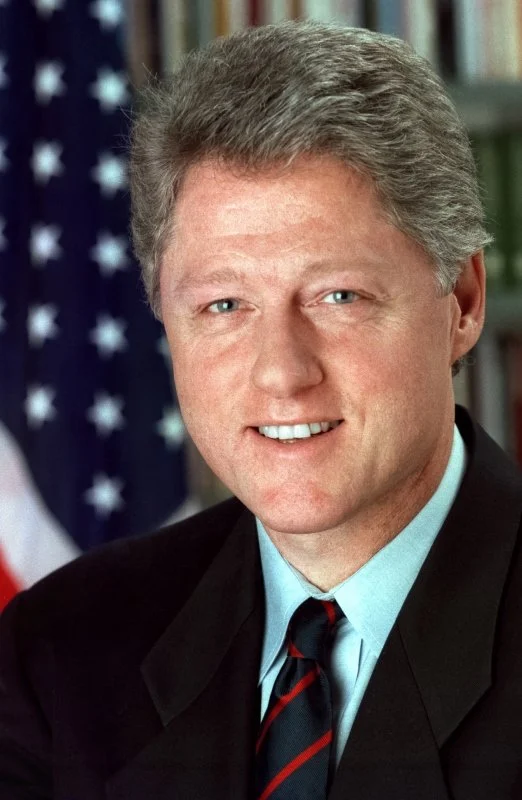Bob McNeely, The White House[1], Public domain, via Wikimedia Commons
Why we think Bill Clinton is a Type 3
"The Man from Hope." Clinton framed his 1992 presidential campaign around the story of his humble beginnings in Hope, Arkansas. He positioned himself as an example of the American Dream, showing his capacity to present an image of success and embody the aspirations of a nation.
"I feel your pain." During the 1992 presidential campaign, Clinton famously empathized with an audience member's struggles by saying, "I feel your pain." This phrase not only illustrated his ability to connect with others but also showcased his skill in presenting himself as a relatable and caring leader, which is consistent with the Type 3's emphasis on image and performance.
Post-presidency endeavors. Since leaving office, Clinton has continued to pursue ambitious goals through the establishment of the Clinton Foundation, which focuses on global health, economic development, and climate change, and has been one of the most influential foundations created by any former U.S. President. This ongoing drive for achievement and impact aligns with the Type 3's desire to be superlatively successful (even after completing two terms as the U.S. President).
Academic achievement. Clinton's ambition and dedication toward his studies helped him earn the prestigious Rhodes Scholarship to attend Oxford University.
All-nighters and policy meetings. Clinton had a reputation for working late hours and immersing himself in policy details. It was not unusual for him to hold marathon all-night policy sessions while serving as Governor of Arkansas and later in the White House. His staff would sometimes find it challenging to keep up with his pace, as he eagerly absorbed the information and discussed strategies for addressing various challenges faced by the nation. His unwavering energy and dedication to understanding and shaping policy solutions demonstrated his tireless work ethic and ambition to achieve successful outcomes.
Balancing policy and politics. Clinton's presidency was marked by a pragmatic approach to policy and politics. He was known for his "triangulation" strategy, which involved finding a middle ground between Republicans and Democrats on key issues. This adaptability and flexibility in the face of various political pressures is consistent with the Type 3’s leadership strengths.
Resilience in the face of adversity. Clinton faced numerous challenges during his time in office, including political scandals and impeachment proceedings. However, he maintained a high approval rating and displayed resilience.
Deceptive behavior. The Monica Lewinsky scandal and Clinton's initial denial of the affair ("I did not have sexual relations with that woman") is as an example of him attempting to protect his image, even at the cost of being dishonest.
Exploiting personal connections. Unhealthy Type 3s can be manipulative or use relationships to further their goals. Clinton's relationship with Arkansas businessman James McDougal and the ensuing Whitewater controversy suggest that he may have used personal connections for personal or political gain.
Compromising values for achievement. In Clinton's case, the "Don't Ask, Don't Tell" policy and the 1994 Crime Bill have been criticized for being politically expedient moves that compromised on more progressive values in order to achieve legislative victories.
Playing the saxophone on "The Arsenio Hall Show." In 1992, during his presidential campaign, Clinton famously played the saxophone on "The Arsenio Hall Show." This appearance helped to bolster his image as a relatable and culturally aware candidate.
Bill Clinton quotes that show he is a Type 3
"Success is not the measure of a man, but a triumph over those who choose to hold him back."
"I believe that the people who are most effective in politics are the people who have a sense of what they want to accomplish."
"My goal has always been to provide opportunity and responsibility to people, to try to empower them to make the most of their own lives."
"You have to be able to maintain your enthusiasm and your commitment to what you're doing, even when the world around you is not cooperating."
"It's how you handle adversity, not how it affects you. The main thing is never quit, never quit, never quit."
"I tried to reform the welfare system so that it was more focused on moving people from welfare to work."
"The future is not an inheritance, it is an opportunity and an obligation."
"The price of doing the same old thing is far higher than the price of change."
"I can only tell you I was motivated by many factors. First, by a desire to protect myself from the embarrassment of my own conduct."
"If you live long enough, you'll make mistakes. But if you learn from them, you'll be a better person."

